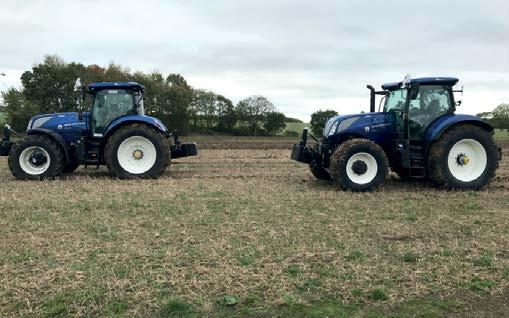NUFFIELD SCHOLARS
The Nuffield Farming Scholarships Trust announced their newest cohort of Scholars in October, many of whom will study topics related to soil management, sustainability, and regenerative farming practices.
“This year’s intake represents a significant change in direction that British agriculture is and must take to ensure a sustainable farming future,” says Mike Vacher, Nuffield Farming Director. “Many of our 2022 scholar’s topics are centred around reducing inputs, regenerative principles, improving efficiency, and mitigating climate change in order to help achieve Net Zero.” “The future of agriculture needs forward-thinking and innovative leaders. This year’s scholars have been selected for demonstrating these traits and the clear passion they possess for their chosen topic.” Six of the 2022 Nuffield Farming Scholars share their backgrounds with Direct Driller and elaborate on their plans for their scholarship journeys…
James Pick Arable Farmer, H Sutton & Son North Yorkshire I am a third-generation farmer working on the family farm near Filey, North Yorkshire. We grow a diverse range of cash crops over an area of around 450ha, with 200ha of this being potatoes on largely rented land. Since returning home to the farm, I have been interested in regenerative agriculture. We are currently transitioning from a min-till to a no-till, regenerative combinable system, however doing so with potatoes poses a very unique challenge. During the past season, we have seen increased yields in our reduced cultivations trial, as well as decreasing the frequency of passes to apply fungicide through a focus on nutrition. All positive signs, but we have a long way to go…
My Nuffield Farming Scholarship, sponsored by the Alan & Anne Beckett Award, will focus on exploring how maincrop potatoes can be grown in a regenerative system. I believe this is an incredibly pressing question in a world which has a growing demand for both potatoes and crops being grown in a manner less detrimental to both soil health and the wider environment. To investigate this, I plan to travel extensively throughout North America, Europe and the UK visiting potato growers, past Nuffield scholars and pioneers of the regen ag world. By visiting these countries, I aim to learn about different establishment methods and the cultivations (or lack of) that were used. This could go a long way toward removing the deep tillage that is widely used in the sector, yet detrimental to soil structure.
88 DIRECT DRILLER MAGAZINE
We have found that by acting as an armour over the winter, cover crops enable us to cultivate less and reduce the amount of compaction faced in Spring. I believe there is huge potential in using cover crops before, or perhaps alongside, potatoes and would like to better understand how they can mitigate the damage done by the establishment and harvesting process. I will also be looking to gain a deeper understanding of how farmers are reducing reliance on artificial fertilisers and pesticides with a nutrition-first policy. I look forward to sharing my future findings with you!
Helen Wyman Commercial Development Manager, Future Biogas Ltd Yorkshire Bioenergy crops divide opinions especially within the agricultural community, however, is this stopping businesses from looking at the potential opportunity for their farm business? I plan to address this in my Nuffield Farming Scholarship ‘Bioenergy crops: An opportunity to address the Triple Bottom Line’, which is sponsored by the John Oldacre Foundation.
My career so far has focused on the agricultural industry, primarily in the arable, environmental, and renewable energy sectors. I have always aimed to help farmers build resilience during change by providing them with new opportunities, including reducing dependence on subsidies early on. After many years working closely with farm businesses, I have realised that assessment of these projects can vary widely. In my experience, those who look at the wider benefits, including the Triple Bottom Line of ‘people, planet and profit', tend to be more successful. By removing the pure profit driver and assessing projects as a whole, famers can move their businesses in directions they didn’t expect. Since starting at Future Biogas more than two years ago, I have seen the benefits of well-integrated, well-managed anaerobic digestion plants, and also experienced the common queries which occur from those outside the AD sector. This led me to look at why there is a perceived resistance to bioenergy crops in the UK and whether there is an opportunity being missed by arable businesses due to misconceptions. When AD can offer non-commodity-linked and longterm contracts, inorganic fertiliser in livestock free areas, carbon sequestration in the soil, as well as permanent CO2 sequestration under the North Sea why is there still such a strong resistance to this cropping diversification? As part of my scholarship, I will visit countries at different stages of ISSUE 16 | JANUARY 2022























